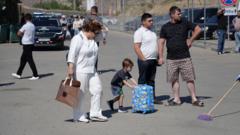Are Iranians Fleeing to Armenia to Escape Conflict with Israel?

Understanding the Human Impact of the Israel-Iran Conflict at the Agarak Border Crossing
The Agarak border crossing between Armenia and Iran serves as a poignant symbol of the human toll of geopolitical conflicts. Situated in a hot, dusty area surrounded by dry, rocky mountains, this border crossing is far from welcoming. Families, individuals, and travelers who have journeyed long hours find themselves in a barren landscape, seeking refuge from escalating tensions back home. As the conflict between Israel and Iran intensifies, the stories of those crossing into Armenia reflect a broader narrative of fear, migration, and resilience.
The Current Conflict: A Brief Overview
The conflict between Israel and Iran reignited on June 13, when Israel launched attacks on military and nuclear sites, as well as populated areas within Iran. This military action has led to a significant loss of life, with reports from the Human Rights Activists News Agency (HRANA) indicating that at least 657 people have been killed. In response, Iran has retaliated with missile attacks, resulting in further casualties, including at least 24 deaths in Israel. This escalation in hostilities has created a climate of fear and uncertainty, prompting many to flee their homes.
The Human Stories Behind the Numbers
As travelers pass through the Agarak border crossing, their stories illustrate the personal impact of this conflict. Many individuals appearing at the border have residency or citizenship in other countries, seeking to escape the chaos that has unfolded in their homeland. Families are often shattered by the fear of violence, as evidenced by a father from Tabriz who described the pervasive danger surrounding him: “All the people are scared; every place is dangerous, it's not normal.” This sentiment resonates among those crossing into Armenia, revealing the shared anguish of families forced to leave everything behind.
Long Journeys to Safety
For many, the journey to Armenia has been fraught with challenges. Travelers from Tehran report that reaching the border takes at least 12 hours, often filled with uncertainty and trepidation. A young Afghan man, who chose to remain anonymous, shared his harrowing experience: “I just escaped from there by very hard way. There were no flights, not any other ways come from there.” Such experiences highlight the desperation faced by those attempting to flee conflict zones, as they navigate dangerous and uncharted territories in search of safety.
The Psychological Toll of Conflict
Crossing the border is not just a physical journey; it is also an emotional one. Many travelers carry the weight of trauma and fear, as seen in the account of a young woman from Australia, who expressed her struggles with the harrowing sights she had witnessed. “I saw something that is very hard, I don't want to talk about it,” she said, reflecting the psychological toll that conflict imposes on individuals. This sentiment is echoed by countless others who are grappling with the horror of violence and its impact on their mental health.
Coping with the Aftermath
The aftermath of such conflict extends beyond the immediate casualties. Survivors are left to navigate their new realities, often facing psychological distress, loss of loved ones, and the challenge of rebuilding their lives in unfamiliar territories. The stories shared at the Agarak border illustrate the long-lasting scars that war leaves on individuals and families, highlighting the need for comprehensive support systems for displaced persons.
The Broader Geopolitical Context
The situation at the Agarak border is not an isolated incident but rather part of a larger geopolitical landscape. Israeli ministers have suggested that the ongoing conflict could lead to regime collapse in Iran, a notion that remains deeply contentious among those affected. Javad, a traveler returning to Germany, dismissed such claims, stating, “Israel has no chance. Israel is not a friend for us; it's an enemy.” This perspective reflects a widespread belief among many Iranians that external interventions are not the solution to their problems.
The Complexities of National Identity and Loyalty
As individuals navigate their identities in times of conflict, the question of loyalty becomes paramount. Some travelers express unwavering attachment to their homeland, as exemplified by Ali Ansaye, who confidently stated, “If I am supposed to die, I will die in my country.” Such sentiments underline the complexity of national identity amid geopolitical strife, emphasizing the deep-rooted connection that many individuals feel toward their homeland, despite the dangers it may pose.
The Role of International Relations
Amidst the turmoil, the role of international relations cannot be overlooked. The conflict between Israel and Iran is steeped in historical animosities and political maneuvering, complicating the resolution process. The question of nuclear capabilities looms large, with many expressing concern over Israel’s presumed nuclear arsenal while Iran advocates for its right to pursue peaceful nuclear energy. As Ali Ansaye articulated, “How can such a small country have nuclear weapons?” This inquiry highlights the perceptions of inequality and injustice that often accompany discussions on foreign policy and military power.
Potential Paths to Peace
While the immediate circumstances may appear bleak, the potential for dialogue and resolution exists. Engaging in diplomatic discussions that address the root causes of conflict can pave the way for a more stable future. The voices of those impacted by conflict must be included in these conversations, as their experiences provide invaluable insights into the human consequences of political decisions. Building bridges rather than walls may ultimately lead to a more peaceful coexistence in the region.
Conclusion: The Need for Empathy and Understanding
The stories emerging from the Agarak border crossing serve as a powerful reminder of the human costs of conflict. As families seek refuge and individuals navigate their journeys to safety, it is crucial to approach these narratives with empathy and understanding. The experiences shared by those affected by the Israel-Iran conflict highlight the urgent need for global attention and action to alleviate the suffering of displaced persons. By fostering compassion and understanding, we can contribute to a more humane response to the challenges posed by geopolitical strife.
FAQs
What is the current status of the conflict between Israel and Iran?
The conflict escalated on June 13, with Israel conducting military operations targeting nuclear and military sites in Iran, resulting in significant casualties and retaliatory missile attacks from Iran. The situation remains tense, with many individuals fleeing the region.
How are families affected by the conflict?
Families are experiencing fear, trauma, and displacement as they seek safety from violence. Many are forced to leave their homes and navigate long, treacherous journeys to find refuge in neighboring countries.
What role do individual narratives play in understanding conflict?
Individual narratives provide a human perspective on the consequences of conflict, highlighting the emotional and psychological toll it takes on affected populations. These stories help to foster empathy and advocate for humanitarian responses to crises.
As we reflect on the experiences of those at the Agarak border, how can we as a global community work together to promote peace and understanding in regions facing conflict? #Peace #HumanRights #ConflictResolution
Published: 2025-06-20 16:01:25 | Category: technology



